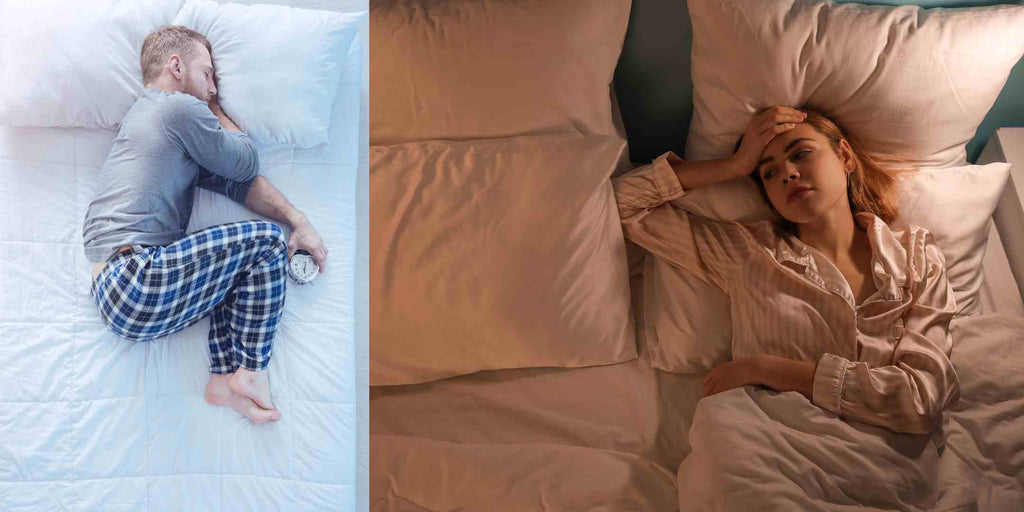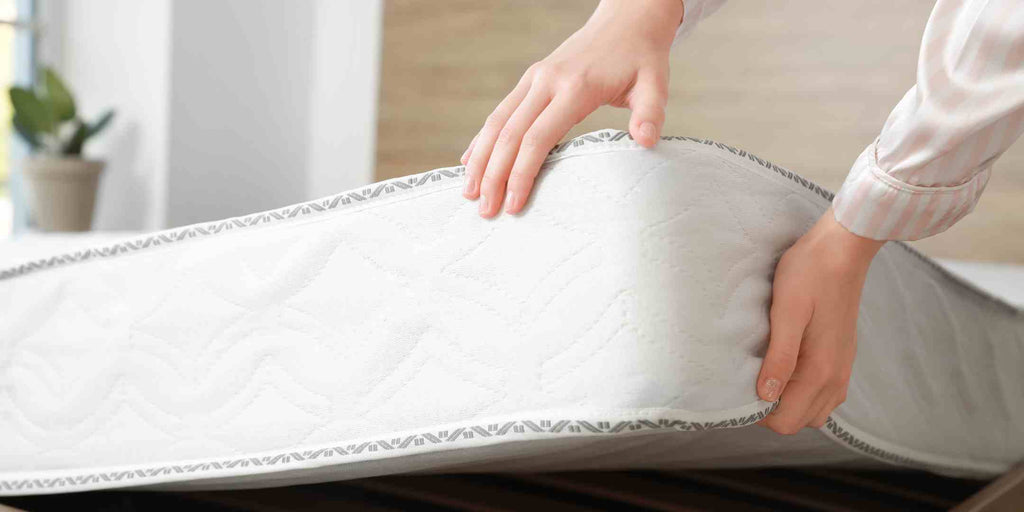A comfortable mattress can mean the difference between waking up refreshed and rejuvenated or groggy and sore. While many believe that a firmer mattress is better for their health and posture, it's essential to strike the right balance between support and comfort. You might also wonder: Is your mattress the culprit behind those sleepless nights? We're here to unveil the hidden indicators, and whisperers from your body that signal it's time to check your mattress and discover the perfect balance between support and serenity for a truly revitalising sleep experience.
Sign #1: Physical Signs

Difficulty Falling Asleep
When a mattress is too firm, it can create a barrier to falling asleep comfortably, and the lack of adequate cushioning and support may lead to increased pressure on certain body parts, making it challenging to find a comfortable sleeping position.
Frequent Waking During the Night
An excessively firm mattress can contribute to frequent waking throughout the night. As the body struggles to find a comfortable position, individuals may wake up multiple times, disrupting the natural sleep cycle.
Neck and Shoulder Pain
A mattress that is too firm may not conform to the body's natural curves, especially around the neck and shoulders. This lack of contouring support can increase pressure points, causing stiffness and discomfort in these areas.
Back Pain
Firm mattresses are often recommended for individuals with back pain, but they can be problematic if they are too firm. An overly firm mattress may not provide enough support to maintain proper spinal alignment, leading to increased pressure on the lower back, resulting in morning back pain and contributing to chronic back issues.
Hips and Joint Discomfort
When a mattress is too firm, it may not provide sufficient cushioning for the hips and joints. This can increase pressure and discomfort in these areas, particularly for side sleepers. Over time, this discomfort can worsen and contribute to conditions like hip bursitis or joint pain.
Poor Circulation
An excessively firm mattress may not allow for proper blood circulation due to increased pressure on specific body parts, leading to tingling sensations, numbness, and even the development of pressure sores in severe cases. Poor circulation during sleep can affect overall comfort and may have long-term health consequences if left unaddressed.
Sign #2: Sleep Quality

Disrupted Sleep Patterns
Discomfort caused by excessive firmness may lead to tossing and turning throughout the night as sleepers continuously shift positions in search of a more comfortable spot. This frequent disruption to the sleep cycle can result in reduced overall sleep quality, leaving individuals feeling fatigued and less rested in the morning.
Frequent Position Changes
Sleeping on an overly firm mattress often necessitates frequent position changes to alleviate pressure points and discomfort. Side, back, and stomach sleepers may find themselves constantly shifting their body positions to find relief. This constant movement can disrupt sleep continuity and make it challenging to settle into a single position conducive to restful sleep.
Side Sleepers, Back Sleepers, and Stomach Sleepers
The firmness of a mattress can impact different sleep positions differently. Side sleepers may struggle with firm mattresses as they may not adequately cushion the hips and shoulders, leading to discomfort and potential numbness. Back sleepers typically require a mattress that provides proper lumbar support and spinal alignment, which may be lacking in a too firm mattress. On the other hand, stomach sleepers may find that a too-firm mattress places excessive pressure on their chest and abdomen, making it difficult to breathe comfortably during the night. As a result, the firmness level of a mattress should ideally align with an individual's preferred sleep position to ensure a restful night's sleep.
Sign #3: General Health Issues

Back and Joint Pain
Sleeping on a mattress that is too firm can lead to back and joint pain because it does not conform to the natural curves of your body, especially the lumbar region of your spine. As a result, your spine may not be properly aligned, causing stress on the muscles, ligaments, and joints, which can lead to discomfort and pain, particularly in the lower back and joints, which can persist throughout the day and potentially contribute to chronic back problems if not addressed.
Numbness or Tingling Sensation
An excessively firm mattress can exert too much pressure on specific areas of your body, restricting blood flow and causing numbness or a tingling sensation, which is particularly common in the extremities, such as your arms, legs, hands, and feet. When these areas are deprived of adequate circulation during sleep, it can lead to discomfort and even waking up with a sensation of pins and needles.
Sleep Disorders Like Insomnia
Discomfort and pain can make it difficult to fall asleep and stay asleep throughout the night. Constantly tossing and turning to find a more comfortable position disrupts your sleep cycle, leading to fragmented and poor-quality sleep. Over time, this can contribute to developing or exacerbating insomnia, leaving you feeling fatigued and unrefreshed during the day.
How to Address Too Firm Mattress Issue?
Mattress Topper or Pad

Adding a mattress topper or pad is a cost-effective and simple solution if your mattress is too firm. These come in various materials like memory foam, latex, or down and can provide an extra layer of cushioning and comfort to your mattress. They can help alleviate pressure points and support your body's natural curves, making your sleep surface more comfortable without replacing the entire mattress.
Adjusting Mattress Firmness

Many modern mattresses, especially those with adjustable firmness settings, allow you to customise the firmness level to your preference. Some mattresses have interchangeable layers or air chambers that you can modify to make the mattress softer or firmer because this option allows you to fine-tune your mattress to a level that suits your comfort needs without the expense of buying a new mattress.
Seeking Professional Advice

If you're experiencing persistent discomfort or pain despite trying the above solutions, it may be wise to consult a healthcare professional or a sleep specialist. They can assess your needs and recommend a mattress that suits your body type, sleep style, and any underlying medical conditions. They may also guide other factors affecting your sleep, such as sleep posture or hygiene, to ensure you get the best possible sleep quality and overall health.
FAQs
1. Can a mattress be too firm, leading to back pain?
- Yes, a mattress can be too firm and contribute to back pain. While firm mattresses are often recommended for individuals with back pain, if the mattress is substantial, it may not provide enough support to maintain proper spinal alignment, leading to increased pressure on the lower back and potentially worsening back pain.
2. How can I tell if my mattress is too firm and causing back pain?
- Physical signs such as waking up with stiffness or soreness in the lower back, frequent tossing and turning during the night to find a comfortable position, and experiencing discomfort or pain in the back while lying down are indicators that your mattress might be too firm and contribute to back pain.
3. What sleep positions are affected by a mattress that is too firm and can lead to back pain?
- Side sleepers, back sleepers, and stomach sleepers can all experience back pain from sleeping on a mattress that is too firm. Side sleepers may struggle with insufficient cushioning for the hips and shoulders, back sleepers may lack proper lumbar support, and stomach sleepers may feel excessive pressure on their chest and abdomen, all contributing to back discomfort.
4. How does a too-firm mattress affect my overall sleep quality?
- A too-firm mattress can disrupt sleep patterns by causing discomfort and frequent waking throughout the night as your body struggles to find a comfortable position. This can lead to fragmented sleep, reduced sleep quality, and feelings of fatigue and unrest in the morning.
5. What can I do if my mattress is too firm and causing back pain?
- If your mattress is too firm and causing back pain, consider adding a mattress topper or pad to provide additional cushioning and comfort. Alternatively, if your mattress has adjustable firmness settings, you can modify it to a softer level. If discomfort persists despite these efforts, seeking professional advice from a healthcare provider or sleep specialist is recommended.
Conclusion
The comfort of your mattress plays an important role in your overall well-being and sleep quality. If you suspect your mattress is too firm, paying attention to the signs of discomfort and potential health issues it may be causing is important. Remember that by ensuring your mattress provides the right balance of support and comfort, you can significantly improve your sleep quality and overall health.
Disclaimer: All the information, including the texts, images, and other materials on this website, is for educational purposes only. While we aim to provide accurate information, nothing on the Megafurniture website should be considered a replacement for medical advice, diagnosis, or treatment. Always consult a qualified medical professional before making any decisions regarding your health.








